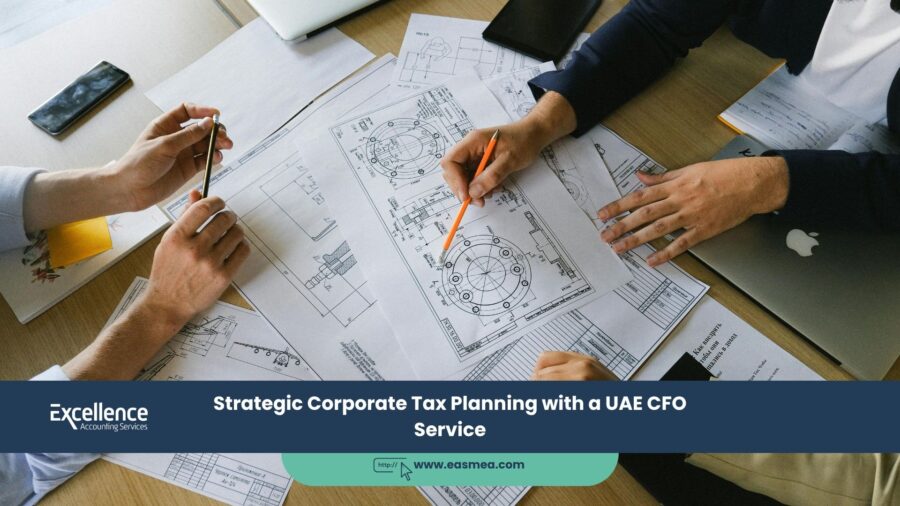Beyond Compliance: A CFO’s Guide to Strategic Corporate Tax Planning in the UAE
The introduction of the 9% Corporate Tax marked a watershed moment for businesses in the UAE. For decades, the region was synonymous with a zero-tax environment, but that paradigm has fundamentally shifted. Today, tax is no longer an afterthought but a critical component of business strategy. Many companies, however, still operate with a reactive, compliance-only mindset: calculate the tax, file the return, and hope for the best. This approach is not just suboptimal; it’s a significant strategic risk that leaves value on the table and invites unnecessary scrutiny from the Federal Tax Authority (FTA).
- Beyond Compliance: A CFO's Guide to Strategic Corporate Tax Planning in the UAE
- The New Reality: From Compliance Burden to Strategic Opportunity
- The CFO's Blueprint for Strategic Corporate Tax Planning in the UAE
- What Excellence Accounting Services (EAS) Can Offer: Your Partner in Strategic Corporate Tax Planning
- Frequently Asked Questions (FAQs)
- Is Your Tax Strategy Working For You, or Against You?
To truly thrive in this new era, businesses must elevate their approach from mere compliance to proactive, intelligent tax management. This is the realm of strategic corporate tax planning in the UAE. It’s a discipline that requires forward-looking vision, deep legal understanding, and intimate knowledge of your business operations. This is precisely the expertise that a Chief Financial Officer (CFO) or a specialized outsourced CFO service brings to the table. This guide provides the CFO’s playbook for transforming your tax function from a cost center into a strategic tool for enhancing profitability, managing risk, and driving sustainable value.
Key Takeaways
- Tax Planning is Proactive, Not Reactive: Strategic corporate tax planning in the UAE involves making decisions today to legally optimize your tax position tomorrow.
- A CFO Integrates Tax with Business Strategy: Every major decision—from pricing and investment to expansion and hiring—has a tax implication. A CFO ensures these implications are considered upfront.
- Compliance is the Foundation, Optimization is the Goal: While flawless compliance is non-negotiable, the real value lies in structuring your affairs to legally minimize your tax burden and maximize after-tax profits.
- Key Levers for Optimization: Effective tax planning focuses on maximizing deductible expenses, utilizing Tax Group structures, leveraging Free Zone benefits, and maintaining robust transfer pricing documentation.
- Expert Guidance is Essential: Navigating the complexities of the UAE Corporate Tax law requires the specialized expertise that a strategic CFO service provides.
The New Reality: From Compliance Burden to Strategic Opportunity
For many businesses, the arrival of Corporate Tax felt like a new administrative burden. The focus has been on understanding the basics of registration, calculation, and filing. While this is a necessary first step, a purely compliance-driven approach is dangerously short-sighted. It’s like driving a car by only looking in the rearview mirror. You see where you’ve been, but you have no control over where you’re going.
Strategic corporate tax planning in the UAE flips the script. It recognizes that the tax law is not just a set of rules to be followed, but a framework with built-in incentives, reliefs, and structural options. By understanding this framework deeply, a business can make informed decisions that not only ensure compliance but also support its overarching commercial goals. A CFO is the leader who champions this forward-looking perspective, ensuring tax considerations are woven into the fabric of every strategic conversation.
The CFO’s Blueprint for Strategic Corporate Tax Planning in the UAE
A CFO’s role in tax planning goes far beyond what a traditional accountant provides. An accountant typically focuses on historical data to ensure the tax return is accurate. A CFO uses that data to architect a future-proof tax strategy. This involves leveraging several key pillars of the UAE Corporate Tax law.
1. Maximizing Legitimate Deductible Expenses
One of the most direct ways to manage your taxable income is to ensure you are claiming every legitimate deduction you are entitled to. A CFO goes beyond the obvious (like salaries and rent) to analyze more nuanced areas:
- Entertainment Expenses: The law allows for a 50% deduction of legitimate business entertainment expenses. A CFO ensures robust policies and documentation are in place to track these costs and maximize the allowable deduction.
- Interest Expense Limitations: The “interest capping” rules limit net interest expense deductions to 30% of a business’s EBITDA. A CFO will model this carefully, especially for highly leveraged companies, and advise on capital structure decisions to optimize this deduction.
- Documentation is King: For an expense to be deductible, it must be wholly and exclusively for the purpose of the business and supported by proper documentation. A CFO implements rigorous bookkeeping and record-keeping processes to ensure every claimed deduction can withstand FTA scrutiny.
2. Structuring for Success: Tax Groups and Transfers
For companies with multiple legal entities in the UAE, group structure is a powerful tool in strategic corporate tax planning in the UAE.
- Forming a Tax Group: If one company in a group is profitable and another has losses, forming a Tax Group allows you to offset those losses against the profits, resulting in a lower overall tax bill for the group. A CFO will analyze if the strict ownership conditions (95%+) are met and manage the application process.
- Intra-Group Relief: The law allows for tax-free transfers of assets and liabilities between group companies. This is crucial for business reorganizations, allowing you to move assets where they are needed most without triggering a tax event.
3. Leveraging Free Zone Advantages Intelligently
The 0% tax rate for Qualifying Free Zone Persons is a major feature of the UAE tax landscape, but it is not a blanket exemption. A CFO provides critical guidance here:
- Meeting the Conditions: To benefit, a company must be a “Qualifying Free Zone Person,” which involves maintaining adequate substance (staff, assets) in the Free Zone and meeting other criteria.
- Segregating Income Streams: The 0% rate only applies to “Qualifying Income.” A CFO will ensure your accounting systems can meticulously track and segregate Qualifying Income (e.g., from trade with other Free Zone businesses or outside the UAE) from non-qualifying income (e.g., from sales to Mainland customers), which is taxed at 9%.
4. Proactive and Defensible Transfer Pricing
Transfer pricing refers to the prices charged for transactions between related parties (e.g., two companies under common ownership). The FTA requires these transactions to be conducted at “arm’s length,” as if they were between unrelated parties. A CFO ensures:
- A Clear Policy: A formal transfer pricing policy is developed and documented.
- Robust Documentation: For businesses that meet the revenue thresholds, maintaining a Master File and Local File is mandatory. Even for smaller businesses, having documentation to justify pricing is a key part of any defense in a Federal Tax Authority audit.
What Excellence Accounting Services (EAS) Can Offer: Your Partner in Strategic Corporate Tax Planning
At Excellence Accounting Services, we move beyond compliance to deliver true strategic value. Our integrated approach combines high-level financial leadership with deep tax expertise to optimize your tax position.
- Strategic Tax Advisory: Our core UAE Corporate Tax service is built on a foundation of strategic planning, not just filing.
- CFO-Led Strategy: Our Outsourced CFO Services provide the leadership to integrate your tax strategy with your overall business goals, ensuring every decision is tax-aware.
- Structuring and Consultancy: We provide expert business consultancy to help you design the most tax-efficient corporate structure, including the formation of Tax Groups.
- Impeccable Data Foundation: Our services for Accounting and Bookkeeping ensure you have the clean, reliable data needed to support any tax position.
Frequently Asked Questions (FAQs)
This is a critical distinction. Tax avoidance is the legal use of the tax code to reduce one’s tax liability (e.g., claiming all legitimate deductions, forming a Tax Group). This is the goal of strategic corporate tax planning in the UAE. Tax evasion is the illegal act of not paying taxes that are legally due (e.g., hiding income, falsifying expenses). The penalties for evasion are severe.
You should consider it if you have multiple UAE-based companies with at least 95% common ownership and you anticipate that some entities will have profits while others have losses. It allows for the consolidation of results, which can significantly lower the group’s overall tax bill. A CFO can perform the analysis to see if it makes financial sense.
The most common mistakes are a lack of proper documentation to support the expense, and attempting to deduct expenses that are not “wholly and exclusively” for business purposes. Another is misinterpreting specific rules, such as the 50% limit on entertainment expenses or the interest capping rules.
Yes. While the detailed documentation requirements (Master File/Local File) apply to larger businesses, the “arm’s length” principle applies to all businesses with related party transactions. If you are audited, the FTA can still challenge your pricing. A CFO would advise on having a simple, documented policy to justify your pricing, even if a full study isn’t required.
This requires careful planning. Income derived from a new Mainland branch would generally not be “Qualifying Income” and would be subject to the 9% Corporate Tax rate. A CFO would help structure the expansion and ensure the accounting systems can clearly segregate the income and costs between the Free Zone and Mainland operations to maintain the 0% benefit on qualifying activities.
Your compensation is deductible, but it must be at a reasonable, “arm’s length” amount. The FTA can challenge a salary that is significantly above the market rate for a similar role in a similar company, viewing the excess as a disguised distribution of profits. A CFO can help benchmark and document the reasonableness of owner compensation.
You must maintain all financial statements, ledgers, trial balances, and supporting documents for every transaction (invoices, receipts, contracts). For strategic corporate tax planning in the UAE, it’s also crucial to maintain documentation supporting your tax positions, such as analyses for deductions, transfer pricing policies, and calculations for Qualifying Income.
A CFO’s role is critical. They will structure the deal in a way that is most tax-efficient for the seller, potentially saving millions. They also lead the tax due diligence process, ensuring there are no hidden tax liabilities that could derail the deal or lower the valuation. This is a key part of our exit strategy services.
Yes, absolutely. A fractional CFO provides the high-level strategic thinking needed to architect the tax plan. They then work in tandem with specialized tax accountants and lawyers to execute the details. This model gives SMEs access to C-suite level strategy without the cost of a full-time executive, making it ideal for strategic corporate tax planning in the UAE.
“Substance” means having a real, tangible presence and conducting genuine business activities in the Free Zone. This is to prevent companies from setting up “letterbox” entities just to claim tax benefits. It generally requires having an adequate number of qualified employees, sufficient operating expenses, and physical assets (like an office) located within the Free Zone, relative to the nature and scale of your activities.
Conclusion: Tax as a Strategic Asset, Not a Liability
In the new economic landscape of the UAE, your approach to tax is a direct reflection of your business’s strategic maturity. A reactive, compliance-only stance is a liability, exposing you to risk and leaving value untapped. A proactive, strategic approach, led by a skilled CFO, transforms tax into a powerful asset. By embedding strategic corporate tax planning in the UAE into your core business decisions, you can enhance profitability, mitigate risk, and build a more resilient, valuable, and successful enterprise.
Is Your Tax Strategy Working For You, or Against You?
Let Excellence Accounting Services provide the strategic leadership to optimize your tax position. Our CFO-led approach to corporate tax ensures you are not just compliant, but strategically positioned for success.




